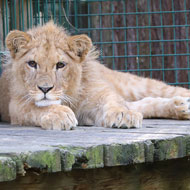
King was kept as a ‘pet’ in a Paris apartment
A young lion cub kept in appalling conditions in an apartment in Paris has been relocated to a big cat sanctuary, the Born Free Foundation has announced.
The one-year-old cub, named King, was rescued last summer after distressing images shared on social media showed him being kicked and beaten by an unknown man in France.
Members of the public notified the authorities, who launched an investigation. King was found in an abandoned apartment, half-starved and cowering in a small dirty cage.
Initially, he was nursed back to health at the Natuurhulpcentrum rescue centre in Belgium, before being transported to his permanent home in South Africa. He will now spend the rest of his days at the Big Cat Rescue Centre, Shamwari Private Game Reserve.
Born Free’s co-founder Virginia McKenna said: “I am sure there will be a lot of smiling faces today! So many people responded to our appeal to bring young King to Shamwari, and now he has arrived!
“Thanks to everyone whose hearts were touched by his story, he now takes his first steps on African soil, and can begin his happy new life. May it be a long and peaceful one.”
Joe Cloete, general manager of the Shamwari Group, added: “To be able to welcome King to his new home is incredibly heart-warming for us.”
Born Free said King’s story before he was rescued highlights the plight of millions of captive wild animals that are kept as pets around the world.
Head of animal welfare and captivity, Dr Chris Draper, said: “It is staggering that, in 2018, lion cubs are still finding their way into the pet trade in Europe. We are concerned that King’s case is the tip of the iceberg, and that a great many wild animals are being kept illegally as pets across Europe and elsewhere.
“This situation needs to be addressed urgently, and we hope that by introducing the world to King – his plight, his rescue and his rehoming to lifetime care – Born Free can draw attention to this important issue.”
Image © NHC



 The veterinary mental health charity Vetlife is inviting the veterinary community to join it for a sponsored cold-water dip.
The veterinary mental health charity Vetlife is inviting the veterinary community to join it for a sponsored cold-water dip.